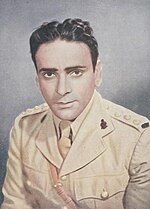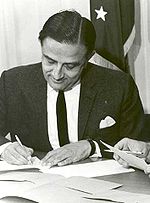Search results
Appearance
There is a page named "G. Sankara Kurup" on Wikipedia
- G. Sankara Kurup, (3 June 1901 – 2 February 1978) also referred to as Mahakavi G (The Great Poet G), was an Indian poet, essayist and literary critic of...33 KB (2,408 words) - 20:14, 30 June 2024
- wisdom. The first recipient of the award was the Malayalam writer G. Sankara Kurup who received the award in 1965 for his collection of poems, Odakkuzhal...47 KB (2,791 words) - 08:09, 15 June 2024
- him/her in Malayalam–language. The award was founded in 1968 by poet G. Sankara Kurup to commemorate the Jnanpith Award he had won. "Ayyappa Panickar selected...9 KB (312 words) - 16:03, 16 April 2024
- Odakkuzhal is a collection of poems written by G. Sankara Kurup in Malayalam. It was published by Mathrubhumi in 1950. It won the first prestigious Jnanpith...1 KB (70 words) - 10:03, 4 June 2024
- 1966 31 August 1967 34 – M. C. Setalvad 3 April 1966 2 April 1972 35 G. Sankara Kurup 3 April 1968 2 April 1972 36 Joachim Alva 3 April 1968 2 April 1974...19 KB (113 words) - 15:58, 23 June 2024
- poets and writers like G. Sankara Kurup, S. K. Pottekkatt, Thakazhi Sivasankara Pillai, M. T. Vasudevan Nair, O. N. V. Kurup, and Akkitham Achuthan Namboothiri...164 KB (13,764 words) - 15:36, 30 June 2024
- Rath Mariadas Ruthnaswamy Firaq Gorakhpuri Shripad Damodar Satwalekar G. Sankara Kurup Periyasaamy Thooran Mamidipudi Venkatarangayya 1969 Tarasankar Bandyopadhyay...29 KB (2,766 words) - 08:12, 1 July 2024
- Rath Mariadas Ruthnaswamy Firaq Gorakhpuri Shripad Damodar Satwalekar G. Sankara Kurup Periyasaamy Thooran Mamidipudi Venkatarangayya 1969 Tarasankar Bandyopadhyay...35 KB (3,330 words) - 09:57, 28 May 2024
- Gopala Pillai Sankara Pillai (June 22, 1930 – January 1, 1989), better known as G. Sankara Pillai, was an Indian playwright, literary critic, and director...27 KB (2,244 words) - 18:51, 11 June 2024
- writers like G. Sankara Kurup, S. K. Pottekkatt, Thakazhi Sivasankara Pillai, Edasseri Govindan Nair, M. T. Vasudevan Nair, O. N. V. Kurup, and Akkitham...95 KB (8,454 words) - 04:00, 29 June 2024
- Two. Vikas Publishing House. pp. 178–180. ISBN 0-7069-1277-2. Noorani, A. G. (27 February 2003). "Our Secrets in British Archives". Frontline. Retrieved...105 KB (10,093 words) - 04:25, 27 June 2024
- by Raveendran and the lyrics were written by Sathyan Anthikkad and G. Sankara Kurup. മേനോന്, രവി (21 May 2018). "വൈരത്തിന്റെ വക മോഹന്ലാല് കല്ലു കൊണ്ട്...4 KB (170 words) - 07:03, 4 March 2024
- Rath Mariadas Ruthnaswamy Firaq Gorakhpuri Shripad Damodar Satwalekar G. Sankara Kurup Periyasaamy Thooran Mamidipudi Venkatarangayya 1969 Tarasankar Bandyopadhyay...14 KB (1,381 words) - 03:34, 19 May 2024
- lyrics written by Balamaniyamma, Changampuzha, Sreekumaran Thampi, G. Sankara Kurup, Vayalar Ramavarma, Kumaranasan, Vallathol, Sugathakumari and P. Bhaskaran...6 KB (316 words) - 13:29, 27 March 2024
- the Sovietland-Nehru Award (twice), Kerala Sahitya Akademy Award, G. Sankara Kurup Award, Puthezhan Memorial Award, Vailoppally Memorial Award, M.C. Joseph...7 KB (711 words) - 13:28, 25 May 2024
- Rath Mariadas Ruthnaswamy Firaq Gorakhpuri Shripad Damodar Satwalekar G. Sankara Kurup Periyasaamy Thooran Mamidipudi Venkatarangayya 1969 Tarasankar Bandyopadhyay...21 KB (2,227 words) - 21:12, 10 June 2024
- research on cosmic rays. The institute was formally established at the M.G. Science Institute, Ahmedabad, on 11 November 1947 with support from the Karmkshetra...16 KB (1,387 words) - 15:52, 1 July 2024
- Rath Mariadas Ruthnaswamy Firaq Gorakhpuri Shripad Damodar Satwalekar G. Sankara Kurup Periyasaamy Thooran Mamidipudi Venkatarangayya 1969 Tarasankar Bandyopadhyay...81 KB (8,428 words) - 08:08, 15 March 2024
- Rath Mariadas Ruthnaswamy Firaq Gorakhpuri Shripad Damodar Satwalekar G. Sankara Kurup Periyasaamy Thooran Mamidipudi Venkatarangayya 1969 Tarasankar Bandyopadhyay...7 KB (677 words) - 02:52, 2 June 2024
- Rath Mariadas Ruthnaswamy Firaq Gorakhpuri Shripad Damodar Satwalekar G. Sankara Kurup Periyasaamy Thooran Mamidipudi Venkatarangayya 1969 Tarasankar Bandyopadhyay...9 KB (884 words) - 16:55, 9 May 2024












